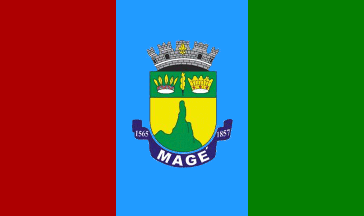 image located by Dirk Schönberger,
20 October 2011
image located by Dirk Schönberger,
20 October 2011Source: http://pt.wikipedia.org/wiki/Mag%E9

Last modified: 2012-04-07 by ian macdonald
Keywords: rio de janeiro | magé |
Links: FOTW homepage |
search |
disclaimer and copyright |
write us |
mirrors
 image located by Dirk Schönberger,
20 October 2011
image located by Dirk Schönberger,
20 October 2011
Source:
http://pt.wikipedia.org/wiki/Mag%E9
Official website at
http://www.mage.rj.gov.br.
Dirk Schönberger, 20
October 2011
The municipality of Magé (271,440 inhabitants in 2010; 386 sq. km) is located in the Rio de Janeiro Metropolitan Area, 50 km of Rio de Janeiro. The municipality is made of the town of Magé proper and of the districts of Santo Aleixo, Rio de Ouro, Suruí, Guia de Pacobaíba and Vila Inhomirim. Magé was established on 18 January 1696 as the commune of Magepe, made the "vila" of Magé on 9 June 1789 by Vice-Roy Luiz de Vasconcellos e Souza and a "cidade" on 2 October 1857. The Barony of Magé was established on 1810 and upgraded the next year to a Viscounty. Magé was known as the "Port of Glory", as the starting point of four of the five big paved ways used to export gold and ore from Minas Gerais. The famous Gold Causeway, aka Minas Gerais New Causeway, was built in 1724 by Bernado Soares de Proença The first railway line in Brazil - also the third in South America - was inaugurated in Magé on 30 April 1854 by Irineu Evangelista de Souza, Baron and Viscount of Mauá, causing the decline of the river ports and mule transportation. Magé is the birth town of the football player Manuel Francisco dos Santos (1933-1983), better known as Mané Garrincha or Garrincha ("Wren"). Considered as the best dribbler ever, Garrincha was member of the Brazilian team that won the World Cup in 1958 and 1962. He played 614 matches with the club of Botafogo in 1953-1965, scoring 245 times, and subsequently played for other clubs until 1972. Garrincha's personal life was much less successful. Quite forgotten, Garrincha died from cirrhosis; thousands of people joined his funeral procession that started from the Maracaña stadium and he was celebrated a few days later by the poet Carlos Drummond de Andrade in the "Jornal do Brasil". His epitaph, coining his nickname, reads "Here rests in peace the one who was the Joy of the People – Mané Garrincha".
The flag can be seen hoisted over the entrance of the Anchieta Palace,
inaugurated in 1949 as the new town hall.
http://www.mage.rj.gov.br/turismo/pontos-turisticos/29-palacio-anchieta - Photo, municipal website
The coat of arms of Magé is prescribed by a Municipal Law adopted on 8 June 1959 and modified by Deliberation No. 380 of 20 August 1973. The coat of arms is a Portuguese shield, "Or 'God's Finger' vert, a chief of the second a Duke's coronet of the first a quill argent a feather coronet of the first. The shield surmounted by a five-towered mural crown argent. Below the shield a scroll azure inscribed in letters argent '1566 MAGÉ - 1857' '".
The Portuguese shield recalls the Lusitanian origin of the country.
The "God's Finger" peak*, a world-famous emblem of Brazilian mountain
climbing, was originally located on the municipal territory of Magé.
The Duke's coronet recalls Luiz Alves de Lima e Silva, Duke of
Caxias**, born in Estrela. The quill recalls the abolitionist Alcindo
Guanabara***, born in Guapimirim, then part of the municipality of
Magé. The feather coronet symbolizes the natives. The fleur-de-lis is
the attribute of the Blessed Virgin, the patron saint of Magé.
The scroll is charged with the years of foundation of the town
("1566", for 7 September 1566) and establishment of the
"cidade" ("1857", for 2 October 1857).
Or symbolizes force, argent symbolizes candor, red symbolizes
intrepidness, blue symbolizes loyalty and green symbolizes abundance.
http://www.mage.rj.gov.br/cidade/brazao
*The "Dedo de Deus" peak (1,612 m), part of the Serra dos órgãos
(Organs' Range) National Park, is located on the territory of
Guapimirim, once a district of Magé. Climbed on for the first time on
9 april 1912 by José Teixeira Guimarães and the brothers Acácio,
Alexandre and Raul Carneiro Américo de Oliveira, the peak is the
symbol of Brazilian mountain climbing. As a symbol of the Rio de
Janeiro State, it is also depicted on the flag and arms of the State.
http://www.flickr.com/photos/rafaellavenere/4294653315 - Dedo de Deus photo
**Luiz Alves de Lima e Silva (1803-1880) is considered as the best Brazilian soldier ever; He is the patron of the Land Forces and his birthday is the Brazilian Army Soldier's Day. After the proclamation of the independence of Brazil, he was appointed standard-bearer of the Imperial Guard of Honor and Battalion. Alves de Lima, nicknamed "The Pacificator of Brazil" or "The Peace Councillor", contributed to the suppression of five uprising that threatened the unity of the Brazilian Empire,, including the "Balaiada" uprising in Maranhão, being rewarded in 1841 with the title of Baron of Caixas, and the "Farroupilha" uprising in Rio Grande do Sul. During the Paraguayan War, he was appointed commander-in-chief of the Brazilian Army, winning several victories and seizing Asunción in 1869, being rewarded with the title of Duke of Caixas.
***Alcindo Guanabara (1865-1918) was born in Guapimirim, once a district of Magé. A brilliant journalist, he was among the founding members of the Brazilian Academy of Literature.
Ivan Sache, 13 March 2012